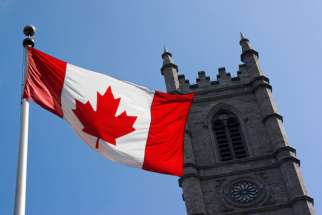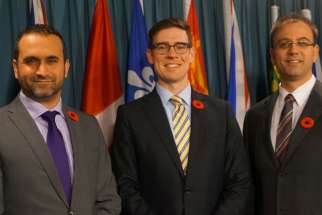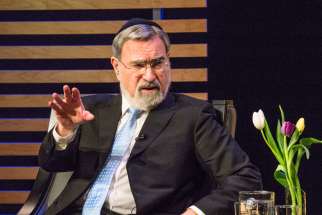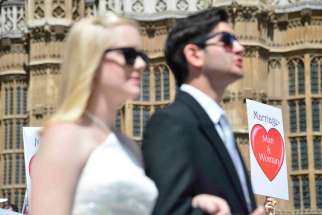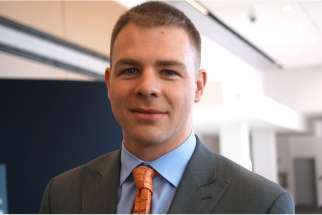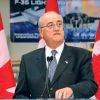Cardus makes sure faith is part of Canada’s 150th celebrations
Think-tank heavyweight Cardus is calling on Canadians to bring religion back into the public square as the nation prepares to celebrate Canada’s 150th birthday.
Cardus selects cabinet to mark Canada’s 150th
The Jewish argument for freedom of religion is embedded in the Old Testament, the former chief rabbi of Britain told an enthralled audience at Toronto’s Glenn Gould Studio March 15.
No reason to celebrate as same-sex marriage turns 10
OTTAWA - On July 20, 2005 same-sex marriage became legal in Canada. Ten years later, Canada has experienced a steady erosion of religious freedom and conscience rights, undergone negative changes in sex education and parental rights, while also seeing a shift in the rights of children, according to several observers.
OTTAWA - The federal 2015 budget is an election document that sets out its vision for the middle class.
Income splitting, child benefit likely safe bets
OTTAWA - A drop in oil prices has played havoc with federal government financial projections and raised doubts whether the federal government can balance the budget, but observers say election promises that would benefit families are unlikely to be affected.
Flaherty’s Catholic heritage shaped his political thinking
OTTAWA - Jim Flaherty was buried out of Toronto’s Anglican St. James Cathedral in a state funeral on April 16 but the political life of the former Finance Minister was shaped by his Catholic upbringing, said former colleagues.
Fantino confirms what NGOs had long suspected
OTTAWA - Non-governmental organizations and charities are finding themselves starved for funds as Canada shifts to a trade–oriented approach to overseas development.
Cardus against ‘intrusive’ union bill
OTTAWA - A Conservative MP’s private member’s bill that aims to bring more financial transparency to labour organizations is too intrusive, says Cardus, a think tank that focuses on social policy.
Study finds Catholic grads are like public counterparts
A recent study has reported that Catholic school graduates view the role of faith in the public square similarly to graduates of public schools.
Cardus, a Christian think tank that focuses on bringing faith into public life, conducted the study, called “A Rising Tide Lifts All Boats.” It covers grads from schools in all provinces except Quebec, which the report covers separately.
The study compares graduates now ages 24 to 39 from government-run public schools with grads in the same age group from various kinds of schools: Protestant private schools, non-religious private schools, religious home schools, Catholic separate schools (government-funded), and Catholic independent schools (private with some government subsidies). Catholic schools in B.C. are independent.
Graduates were compared on a wide range of topics in addition to religion. However the study gives little information about what their actual responses were; it just reports how other grads compared to grads from public schools.
In total, 1,868 graduates were surveyed. In addition, the results were controlled for family socioeconomic and religious background.
The study revealed some interesting facts about faith in the public square.
“What struck me the most was that Catholic schools were the same as public schools in many respects,” said Ray Pennings, the study’s project leader and the director of research at Cardus.
The study showed grads from both kinds of Catholic schools were less involved in volunteering their time with their congregations than grads from Protestant schools, religious home schools and public schools. But they scored the same as public-school grads on their views on the importance of religion in public life.
“You would have expected to find some spiritual differences, but they weren’t there (for Catholic grads),” Pennings said, “which is distinct from the Protestant schools, where we were getting measurable differences.”
Pennings added graduates from Protestant schools said their faith made an impact on their cultural engagement.
They gave more time to their church than Catholics, but were less political. Catholic-independent-school grads volunteered more than Catholic-separate-school and public-school grads outside their congregation, but were less politically engaged.
“I am surprised by the results,” said Doug Lauson, superintendent of the Catholic Independent Schools of the Vancouver Archdiocese (CISVA). He said he would have expected religious training provided by schools would have an effect on how students lived their faith after graduation.
But Lauson noted that the sample size for Catholic-independent-school grads was low.
“Only 23 were sampled from the whole of B.C., and I don’t know how many of those were from our diocese.”
However, he added, secularization in society is a factor not only for Catholic schools but for Protestant ones as well.
He said CISVA is looking at ways to address this issue with students.
“Young people are in a bit of a difficult situation, because in school they learn one set of values, and then they go to the shopping mall and they’re surrounded by a different set of values,” he said.
“Our graduates should be aware of the world out there and should be prepared to defend their faith in a world that is very secular, and where the practise of your faith is allowed but frowned upon.”
With regard to employment, the study showed grads from both types of Catholic schools were similar to public-school grads. All three groups obtained managerial occupations (managerial professionals, lawyers, scientists, architects and university teachers) at the same rate.
With regard to how workplaces are run, the three groups held the same views on ethics and efficiency.
Catholic independent grads scored well in post-secondary education. They came in second to non-religious independent grads in total years of education, but were more likely than any other grad in the study to have a university degree. They also scored the highest in obtaining masters degrees.
Lauson said CISVA schools always aim to prepare students for university.
“We general ly provide education to students to enter university if they choose to,” he said. “Our graduates are required to obtain more credits because we offer more subjects than government-run schools.”
He also said CISVA focuses on developing “skill sets” for students to learn for the 21st century. The Ministry of Education recently recognized them for their unique teaching methods.
The complete Cardus survey is at http://www.cardus.ca/research/education.


